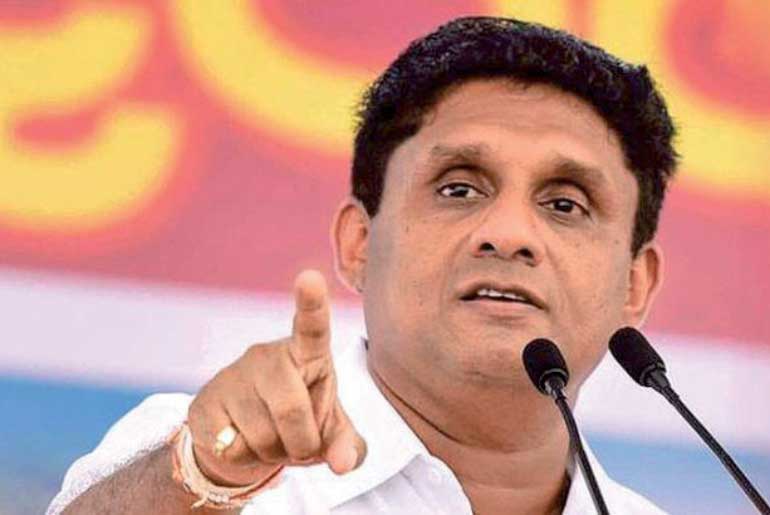Monday Feb 16, 2026
Monday Feb 16, 2026
Tuesday, 1 June 2021 01:19 - - {{hitsCtrl.values.hits}}

SP has grown to a matured leadership inculcated through his ability to listen to other voices, comprehend different ideas and views and synthesise them for a new dimension
 In recent times, many people who wrote to newspapers and news bulletins expressed contrasting views on the emergence of Samagi Jana Balawegaya (SJB) as a political party which demonstrates the potential to govern the country in near future. I accept that any person, resided inside or outside the country, may question or support the course of the SJB in the present political environment of the country. This article is not simply an attempt to justify the formation of the SJB but an attempt to start a fruitful discussion on whether the SJB and its economic, political, social, cultural and international contexts can make a path-breaking change in the political landscape of Sri Lanka.
In recent times, many people who wrote to newspapers and news bulletins expressed contrasting views on the emergence of Samagi Jana Balawegaya (SJB) as a political party which demonstrates the potential to govern the country in near future. I accept that any person, resided inside or outside the country, may question or support the course of the SJB in the present political environment of the country. This article is not simply an attempt to justify the formation of the SJB but an attempt to start a fruitful discussion on whether the SJB and its economic, political, social, cultural and international contexts can make a path-breaking change in the political landscape of Sri Lanka.
Rise and fall of parties
In democratic societies, political parties reflect an important role of representative democracy and are known as gatekeepers of democracy. In a dynamic democratic political system, some parties emerge newly and some parties become defunct gradually. The sole reason for the emergence of a new party or obsolescence of an existing party is the validity of its role as a representative democratic institution and a gatekeeper of democracy. A party will become obsolete or defunct when its membership, at least a sizable group, thinks that the party has failed to protect and promote their rights, expectations, interests and wills and therefore to stand as a gatekeeper of democracy.
A new party emerges when at least a sizable number of citizens agreed to work in a common policy framework and action plan in order to protect their democratic institutions and stand together for the delivery of agreed upon rights, expectations, interests and wills. In educated and informed societies, one may expect political parties to adjust regularly to the ground conditions for their long-term survival and existence. Political parties which consistently fail to deliver rights, expectations, interests and wills of its members, to stand as a gatekeeper of democracy and adjust to the socio-economic-political-cultural ground conditions are more prone to be defunct and obsolete.
As some people think, the emergence of the SJB is not a hasty mistake but a well-crafted timely feat in response to prolong requests of people of this country. It is not a political error but a political triumph for people, those who seek an alternative not only to the UNP, but also to Podujana Peramuna, Freedom Party, leftist parties and some minority-driven parties. In this discussion, my focus is not to argue for a course that instates Sajith Premadasa (SP) as a better leader than Ranil Wickremesinghe (RW) or the vice versa. In my view, it was the UNPers who left the party during a period of near three decades from the point where RW took-over the leadership was instrumental in forming the SJB.

RW assumed the leadership of the party after the death of its charismatic leaders J.R. Jayawardene and Ranasinghe Premadasa and high calibre leadership candidates Lalith Athulathmudali and Gamini Dissanayake. The UNP under the leadership of RW fails to stand as a gatekeeper of democracy since the democratic practices are not maintained within the party. The UNP under the leadership of RW fails to protect and promote the rights, expectations, interests and wills of its general supporters.
Conspiracy led by the party leader against potential leadership candidates, Karu Jayasuriya, SP, etc., promotion of his cronies to the party hierarchies and the manipulation of the working committee for his own benefits discouraged the membership as they felt that the UNP has been surrendered to a group of crony-capitalists who consistently ignored the community and village level grass root supporters, simply the vote machine of the party.
The departure of party policies from a people-centred social democratic one to more liberal policy orientation and actions against general consumers, farmers, working class, poor, etc. in favour of crony capitalists has derailed the UNP from its founding principles and therefore experienced a massive drain of membership. Non-consultative and ill-informed policies and actions taken to win the hearts of minority parties in an attempt to solve ethnic conflict hurt the Sinhalese majority voters and as a result the Sinhalese vote base of the party drained down continuously.
The loss of support from the Sinhalese community made it fairly impossible for the party to win a presidential election and a general election. Continuous and numerous election defeats branded RW and the UNP as ‘ever losers’ and the loser mindset further reduced the vote base. After the Presidential Election 2019, the mass supporters of the UNP expected the transfer of leadership to SP as he has proven his leadership capacity in reviving the membership at grass-root level and keeping the UNP back on its own feet. The UNP leadership, nevertheless, was not ready to transfer the power and in fact tried to devise a mechanism to cement his leadership until the death.
The gracious acceptance of the new party by the masses has proven its legitimacy and relevance in the political course of this country. It is of course essential for the SJB and the UNP to come to an agreement to work together, however, such a coalition should neither affect the novelty of the SJB nor should it bear the sings of RW and his clang. What UNP is waiting for at the moment is to build up its muscles to make a deal with the SJB, but the UNP should realise the fact that its muscles have been drained down to the extent of never recovery.
Reviving among all communities
The leadership of SP and the SJB is well-received at all layers of the Sinhalese community now. Certainly, the SJB claims the credits of respected and charismatic leaders such as D.S. Senanayake, Dudley Senanayake, John Kotelawala, J.R. Jayawardene, R. Premadasa, and will shape its socio-economic-political responsibility based on such good deeds. SP has grown to a matured leadership inculcated through his ability to listen to other voices, comprehend different ideas and views and synthesise them for a new dimension.
The Sinhalese masses have now realised that the SJB as a new party will and should have a novel approach to ethnic issues, minority issues and power sharing in a framework of one country. This open and transparent approach has provided a moral easiness for them to regroup around the SJB and its leadership. Another important trend is that the SJB is now receiving as a new option for minority groups to re-join a mainstream political party after two-three decades of extreme political fragmentation by communities. The Muslim, Sri Lankan Tamil and Indian Tamil communities, as individuals and small groups, begin to place their faith on SP as a national leader and join the SJB. This trend can be observed in different parts of the country including north, east and the plantation sector.
SJB as a change agent
In my view, one should not waste time and energy too much discussing the emergence and the credibility of the SJB given its inevitable emergence as a front-line political party. Instead, one should place more emphasis on what SJB can do to make a change in the socio-economic-political path of this country and achieve the prosperity that people and the country looking for decades.
I found some interesting comments in an article written to Colombo Telegraph on 23 May by Dr. Mahim Mendis. One comment seriously questions SP’s ability to transform public sector companies to a competitive profit-making sector by making it free from prolong political objective of employment generation. The same commentator questions “how a government enterprise be (made) profitable when even private sector ones are struggling”, “why a million of able-bodied men are driving three-wheelers while their women slave away in garment factories”. Another commentator in nutshell questions the economics of dealing with foreign exchange crisis of the country and whether SP has a magical formula to resolve the devaluation of the Sri Lankan Rupee even against the currencies of India and Bangladesh.
I presume that these comments and questions are much trickier to answer than a question on the emergence of the SJB. The SJB should make an investment in terms of intellectual capacity to find solutions to these issues than engaging in tit for tat mode of discussions. Certainly, the SJB should find solid and comprehensive policy framework covering areas of policy concerns. As the party has started an extensive discussion on its policy frameworks, the SJB will soon be able to come up with solid and comprehensive policy framework in which attention be given not only to macro level issues but also to micro level issues such as why a million of able-bodied persons are driving three-wheelers, what is the magical formula that Sajith has to overcome the depreciation of the rupee, etc.
Guiding principles of the SJB policy
Following the policies of past analogues regimes, especially the working principles adopted by Ranasinghe Premadasa throughout his career, the SJB embraced the conceptual framework of social democracy as the guiding policy concept and principles of the SJB. In general, the social democracy while maintaining liberal interventions in order to entice businesses and enhance national income advocates socio-economic and political mediations to guarantee social justice by way of income redistribution, protecting the vulnerable, providing public goods such as education and healthcare free of charge, regulating the economic activity to garner the maximum national interests, etc.
Social democracy is, nevertheless, a concept and practical framework which has evolved significantly over the last five-six decades and practiced with significant variations in different countries. In my view, the policy orientation of main political parties in Sri Lanka is grounded on the concept of social democracy with a variation in approach towards more liberal economy or towards more socialistic economy. Certainly, the SJB would place its policy choice in between the principles and practices of the liberal economy and the socialistic economy.
On one hand, the SJB should promote businesses and economic activity to the highest possible levels in order to increase the levels of national production and income. On the other hand, the SJB should make sure that it curbs the intolerable injustice and inequality such as 20% of poorest getting 4.8% of national income and 20% of richest getting 51% of national income through its redistributive and welfare policy instruments. This approach requires the SJB to make a balance between the two objectives growth and equity not only at its macro level operations but also at micro level or sector specific level operations.
(The writer is a Professor in Economics at the Department of Economics and Statistics, University of Peradeniya. Currently, he serves as the President of the Intellectual Forum for People (Janathavadi Buddhi Mandapaya), a forum of university academics, researchers and experts. He is available for any clarification via email at [email protected].)